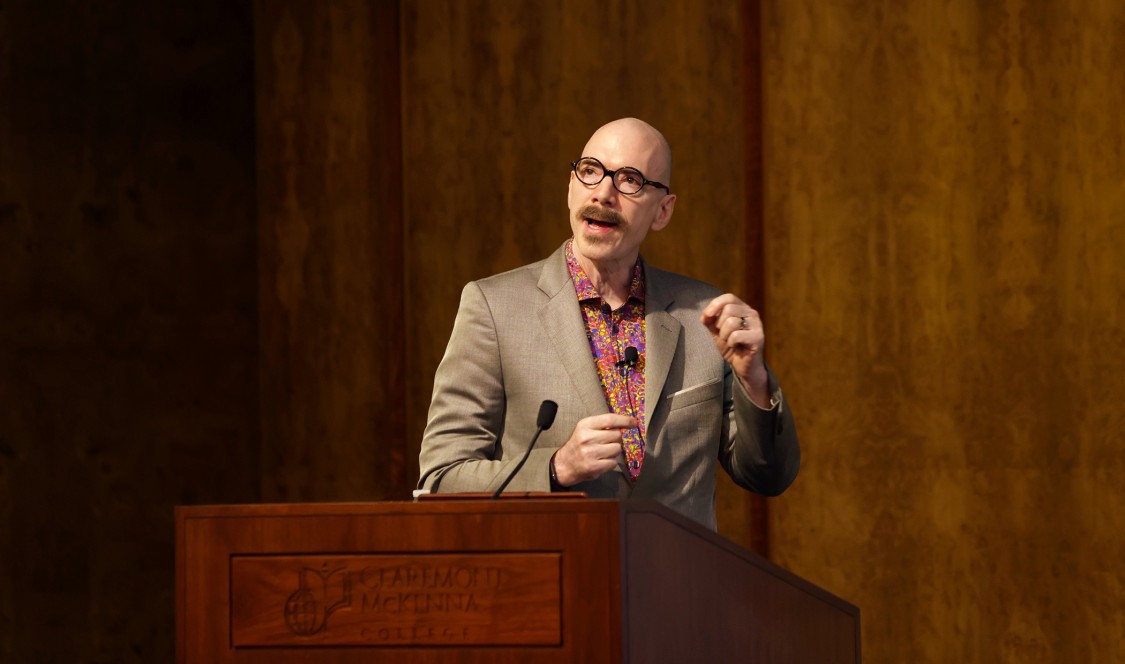Filmmaker and professor of radio, television, and film at Northwestern University David E. Tolchinsky P’20 visited the Athenaeum on April 11, inviting CMC students to engage in thoughtful dialogue about how mental health is depicted in film and television.
“This is not a talk, it’s a discussion, and I welcome your questions at any time,” said Tolchinsky, who is also the founding director of Northwestern’s MFA in Writing for Screen and Stage program and a longtime screenwriter who is currently producing a horror feature for Shudder/AMC Networks about extreme isolation.
The discussion was organized around questions he has been investigating with students as director of the Pritzker Pucker Studio Lab for the Promotion and Creation of Mental Health via Cinematic Arts: When should we strive to be accurate in our mental health depictions? When does creative license trump accuracy? What are the ethics of representing trauma on screen?
In the lab, students interview experts—including advisory board members who are psychiatrists, psychologists, filmmakers, playwrights, and documentarians— and people with lived experience with mental health conditions, and then look at the psychology, artistry, and technique in films and TV shows. The ultimate goal, Tolchinsky said, is “to try to help normalize mental health and to turn out filmmakers that have a more nuanced understanding of mental health.”
Mass media has long perpetuated a negative stigma around mental health issues like suicide, depression, bipolar disorder, and OCD; and inaccurate portrayals have been part of the problem. But, for Tolchinsky, the question of accuracy was not as straightforward as it might seem.
“When we thought about starting this program about mental health and film depictions, we thought the easy answer was: let’s try to have more accurate portrayals of mental health conditions. And as my students and I have been investigating this, what became clear is that accuracy is actually a very complex topic, and it’s a complex goal, and I’m not sure if you always want that goal.”
Tolchinsky shared clips from various films and TV shows, such as “Psycho,” “Good Will Hunting,” “Fight Club,” “Monk,” “Euphoria,” and “Modern Love,” revealing the complex balance between accuracy and artistry. Sometimes, by taking creative license, a film can promote understanding, and get people to change their minds about stereotypes or stigmas about mental health conditions.
“From my perspective, how you change their minds is to create very compelling dramas, very funny comedies, and very scary horror films. And so my program actually embraces horror as an aspect of investigating mental health,” said Tolchinsky.
He cited Jordan Peele as an example of a filmmaker using horror in an exciting and innovative way “to have deep discussions about trauma, about racism, about the ills of society.”
“If you can find a way to watch [horror films], I think there is a lot of learning both as an audience member and as a filmmaker,” he said. “People have asked me, why do you want to be involved in this material? When I’m working on something darker. And I think it’s me working something through.”
Speaker quote: “As a filmmaker, you can’t just depict mental health. You have to make artful films that grab people, move people, make people laugh, make people think.”
From the audience: Students asked probing questions about accuracy, ethics, labeling, and the retraumatizing that can occur, for both film cast and crew and audience members, when difficult subjects are tackled. CMC history major Laura E. Somoza Velez ‘24 asked: “Do you think fantastical storytelling has any place when speaking about mental health?”
Tolchinsky’s response: “At the head table, we were talking about ‘Everything, Everywhere, All at Once’ and … that definitely has a fantastical element. But I think it’s a portrait of this mother and daughter relationship and trauma between them, and I read the daughter as having depression, although again, it’s not spoken. … And so I think that film really captured it.”
“Filmmaking is complex. You’re going to do one thing that moves people, but then other people are going to say, but are you belittling … mother/daughter strife or whatever cultural issues that we were talking about in that movie or depression because you’re putting it in this milieu or in a horror film? I don’t think so. But it’s really the filmmaker, the student filmmaker and the professional, thinking about all the aspects of this and the ethics of it too. … Who might be hurt, who might be helped? And ultimately, you have to make a choice, and you have to make your film, and you have to follow your muse, but I’m just encouraging you, as I think you are, to be thoughtful.”

